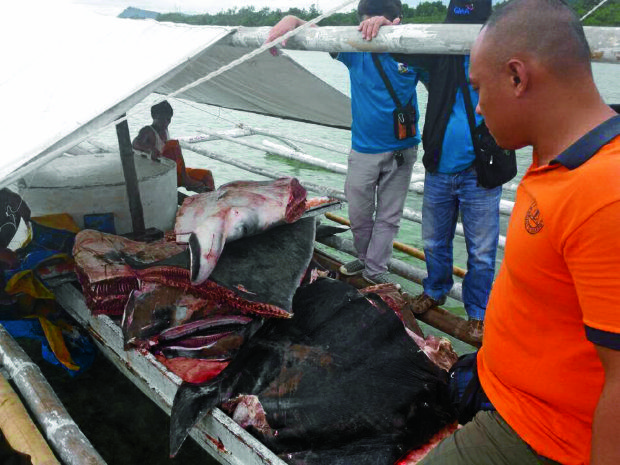Couple nabbed for trying to sell meat of endangered manta ray

Personnel from Philippine Coast Guard (PCG) and Bureau of Fisheries and Aquatic Resources (Bfar) in Bohol have confiscated at least 2 tons or 2,000 kilos of sliced manta ray meat locally known as “sanga” in Baclayon town, Bohol province on Thursday. PHOTO COURTESY: RALPH BARAJAN/PCG-PANGLAO
TAGBILARAN CITY, Bohol—A couple bought two tons of manta ray meat for P40,000 which they intended to dry and later sell for at least P300 per kilo.
But instead of reeking in profit, Gomer Valeroso, 49, and his wife Milagrosa Valeroso, 47, ended up in jail.
The two were arrested after a Philippine Coast Guard personnel saw the slabs of sliced manta ray on the couple’s motorbanca in the port of Baclayon town, Bohol past 4:30 p.m. on Thursday.
The two would face charges for violating the Philippine Fisheries Code (Republic Act 8550) that prohibits the hunting, killing or selling rare, threatened or endangered species listed in the Convention on International Trade in Endangered Species of Wild Fauna and Flora (CITES).
Manta ray, known as “gentle giant” is on the list of endangered species.
Violators face a fine of P120,000 or prison term of 12 to 20 years.
Erick Salcedo, deputy commander of Philippine Coast Guard -Tagbilaran City, said their personnel in PCG substation in Panglao and Pamilacan islands conducted a mobile patrol on Thursday afternoon near Baluarte in Baclayon town.
They spotted a motorbanca (MBCA The Original Double D) which was loaded with cut-up manta ray meat while still docked at the pier.
A Coast Guard personnel also later found slices of manta ray meat inside a yellow jeepney (with plate number 074807).
It turned out that couple transported the manta ray meat from Jagna town to Baclayon on board the jeep and then loaded these to the motorbanca so they could take these home on Pamilacan Island.
Salcedo said they contacted the Bureau of Fisheries and Aquatic Resources (BFAR) to check if the pieces of meat belonged to the endangered species of manta rays.
Pedro Milana, Jr. in-charge of BFAR-Bohol, confirmed that the cut-up marine animal belonged to manta alfredi and manta birostris both protected under Fisheries Administrative Order (FAO) 193 and Republic Act 9147, also known as the Wildlife Resources Conservation and Protection Act.
The couple, however, claimed they didn’t know that what they bought were endangered species.
They said they bought the 2,000 kilos of meat from Tita Oclarit, a resident of Jagna town, for P40,000. The fishes measured at least two meters each.
“We didn’t know that what we were doing was illegal. We bought the meat because this is our livelihood,” said Valeroso.
Valeroso, who sells dried fish, said they intended to dry the meat and sell it P300-400 per kilo.
The confiscated manta ray was buried by BFAR in Calape town, Bohol.
The manta ray is considered a “vulnerable” species in the International Union for the Conservation of Nature (IUCN) red list of threatened species.
The BFAR also prohibits taking, selling, purchasing, possessing, transporting and exporting manta rays and whale sharks.
A fine of P500 to P5,000 and imprisonment for six months to four years or both will be imposed on the violator.
Still, hunting has become so common that experts believe the species could be close to extinction.
Salcedo said the manta ray may have been caught in the seas off Bohol where manta ray hunting has long been recorded in Bohol waters especially in Pamilacan Island, which used to be the lair of former hunters of dolphin, Bryde’s whales, whale sharks and manta rays in the area.
Fishermen catch manta rays, locally called “sanga,” to cook them as “kinilaw”(ceviche) or “linabog” (a stew-based dish cooked in tomatoes and chilis).
But some customers preferred the dried stuff.
Dried gills and meat from manta rays and stingrays are allegedly sold to Chinese pharmacies, as Chinese traditional medicine believes the meat can cure chicken pox, infertility and cancer.
RELATED STORIES
Shark species, manta rays now internationally protected